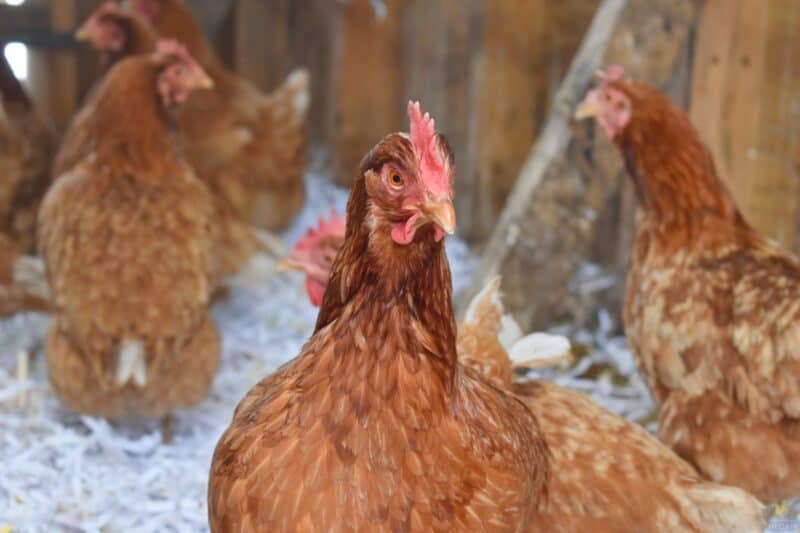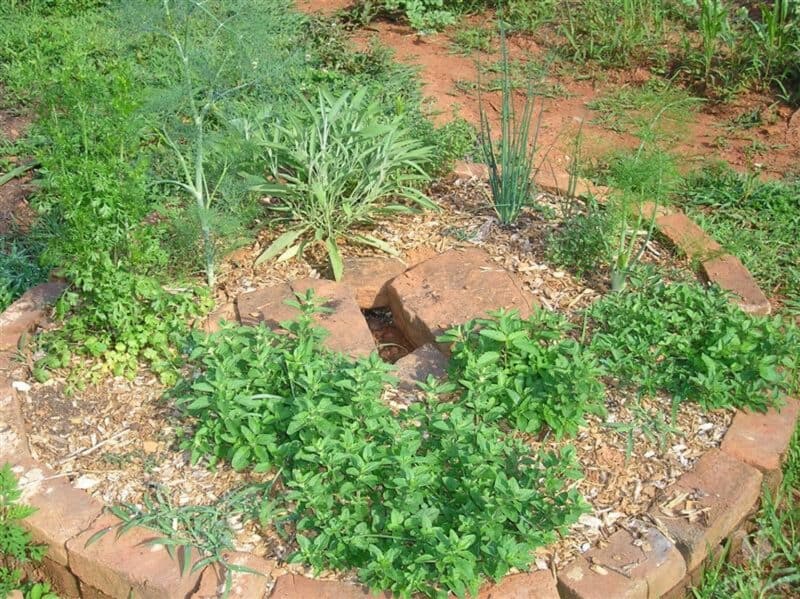Every chicken owner knows that their precious birds are wide-ranging and adventurous eaters, and they seem to enjoy a very diet that includes both fresh and prepared foods.

Every chicken keeper that also has a garden has likely already encountered the exasperation that occurs when chickens break in and start nibbling on your herbs and veggies.
Speaking of herbs, can chickens eat sage?
Yes, chickens can eat sage. Fresh or dried, sage is a great inclusion in a chicken’s diet for its proven antimicrobial properties, and it can significantly improve skeletal health.
Sage is just an herb for us, one with an illustrious history and a delicious peppery taste, but still just an herb.
To your chickens, however, it’s a veritable superfood that can help keep them healthy in a number of ways.
And, just like us, chickens really do seem to like the taste. This article will tell you everything you need to know about feeding sage to your flock.

Nutritional Profile of Sage
Sage is not a vegetable in the traditional nutritional sense. The health benefits go beyond vitamins, minerals, and mere calories.
That being said, sage does contain a few calories and a scant amount of carbohydrates along with a smattering of vitamins and minerals, including vitamins A, K, C, and E along with zinc, magnesium, and copper.
| 100g Sage | Amount |
|---|---|
| Water | 7.96g |
| Calories | 315 kcal |
| Protein | 10.6g |
| Total Fat | 12.8g |
| Ash | 7.95g |
| Total Carbohydrates | 60.7g |
| – Dietary Fiber | 40.3g |
| – Sugars | 1.71g |
| Calcium, Ca | 1650mg |
| Iron, Fe | 28.1mg |
| Magnesium, Mg | 428mg |
| Phosphorus, P | 91mg |
| Potassium, K | 1070mg |
| Sodium, Na | 11mg |
| Zinc, Zn | 4.7mg |
| Copper, Cu | 0.757mg |
| Manganese, Mn | 3.13mg |
| Selenium, Se | 3.7µg |
| Vitamin C | 32.4mg |
| Thiamin | 0.754mg |
| Riboflavin | 0.336mg |
| Niacin | 5.72mg |
| Vitamin B-6 | 2.69mg |
| Folate, total | 274µg |
| Vitamin A, RAE | 295µg |
| Carotene, beta | 3480µg |
| Cryptoxanthin, beta | 109µg |
| Vitamin A, IU | 5900 IU |
| Lutein + zeaxanthin | 1900µg |
| Vitamin E | 7.48mg |
| Vitamin K | 1710µg |
| Fatty acids, total saturated | 7.03g |
| Fatty acids, total monounsaturated | 1.87g |
| Fatty acids, total polyunsaturated | 1.76g |
It should also be noted that fresh sage has the very best nutritional profile if you want to genuinely give your birds something to eat while improving their health.
Dried sage still tastes wonderful, but the vitamin and mineral content take a big hit.
Just remember, fresh is best when it comes to giving herbs to your chickens.
Health Benefits of Sage for Chickens
Sage has several wonderful benefits for your bird. Sage plants contain well over 150 different antioxidants and many other compounds besides that are all linked to improved health in various ways.
But, scientific studies have proven that sage works as both an antifungal and antibacterial agent in chickens, and is specifically effective against yeast infections, salmonella, E. coli, and staph.
This can keep your birds from getting sick, and it also shows some efficacy in treating persistent conditions like sour crops.
Perhaps the single best attribute of sage is as an anti-osteoporosis supplement.
Sage can actually prevent bones from losing mass, and can help the body absorb minerals necessary for bone health.
This is a huge benefit for all chickens, but in particular older birds and laying hens which are always at risk of mineral depletion (calcium in particular for obvious reasons).
Considering just how available and inexpensive sage is, there’s no reason whatsoever that you shouldn’t be adding it in your flock’s diet, especially in the diet of your hard-working hens that are still laying.
Can Chickens Eat Fresh Sage?
Yes, chickens can eat fresh sage. This is good, because fresh sage has far more health benefits for chickens than dried.
In fact, if you are going to include sage in your flock’s diet it’s best to choose from the many varieties of fresh-cut herbs available in most grocery stores or grow your own. More on that in just a second.
Can Chickens Eat Dried Sage?
Yes, they can. Dried sage still has some beneficial antimicrobial properties, and it tastes good too.
That being said, you should always opt for fresh sage first if you can find it, as the nutritional profile is not as strong when in a dried form.
Can Chickens Eat Cooked Sage?
They sure can. Although sage is rarely cooked on its own if, for whatever reason, you decide to serve up some sage-infused dishes to your chickens, they will be able to digest and benefit from it.
Never Feed Sage to Chickens that Has Been Prepared with Harmful Ingredients
But on that note, you should make it a point to never, ever feed your flock sage that has been prepared with harmful ingredients like salt, butter, and other things like that, or used as an ingredient in any dish containing things that chickens shouldn’t have.
Lots of ingredients and seasonings you and I take for granted can be extremely harmful to chickens and can even be deadly in some cases.
You might think you are giving your chickens a treat by sharing some home-cooked leftovers, but you shouldn’t unless you are absolutely sure it is 100% safe for them to consume.
Consumption of salt, butter, sugar, and other “human food” can lead to such issues as kidney damage, fatty liver, heart arrhythmia, and more.
So make sure to check the ingredients before deciding to share any human food with your feathered friends, and if you have any doubts about something, simply don’t do it.
Beware of Pesticides on Live Sage Plants
We’ve established that fresh is best when it comes to giving sage to your chickens, but you will need to be quite cautious of pesticides that are likely on these plants if you decide to purchase fresh grocery-store herbs or a nursery-grown plant.
It is well known that many varieties of sage are especially attractive to pests and accordingly they are often heavily treated with pesticides so they can make it to market.
Pesticides can be extremely dangerous to chickens, and many of the common pesticides used on sage plants can have devastating effects. Pesticide poisoning in chickens is a serious concern over time.
You should always wash any purchased herbs or plants thoroughly before you give anything to your chickens, and understand that residues will remain in the tissues of the plant.
A better option is just to grow your own: sage is an easy herb to grow and it takes up very little space, so you can even have a few pots of sage in your backyard for your chickens to munch on whenever they feel like it.
How Often Can Chickens Have Sage?
Chickens can have sage pretty much all the time. It’s a very healthy herb, and they can eat it fresh, dried, or cooked with no problem.
You don’t want to make it the fixture of every meal, of course, but it does the most for your birds when it is eaten regularly.
Mixing in sage with several meals throughout the week will ensure they get the most benefits.
Preparing Sage for Your Flock
You have a couple of options for serving sage to your flock depending on whether or not it’s fresh or dried.
If fresh, you can tear it into small pieces and sprinkle it over their food, or simply leave a few sprigs in their pen for them to peck at. If you have dried sage, you can lightly crush the leaves and mix them with feed.
Use a little olive or seed oil to make it stick to their food so it doesn’t go to waste…
Alternately, make a sage-infused water recipe that they can drink when it is hot out; this is a great way to get the benefits of sage while keeping your birds hydrated.
Whatever way you serve it to them, your birds will like it, and they will surely reap its potent benefits.
Can Baby Chicks Have Sage, Too?
Yes, baby chicks can have sage, too. However, you should wait until they are at least 4 weeks old before giving them any.
In the early stages of development, it’s best to stick with the chick starter feed that is specifically designed for them.
Sage will have the same benefits for chicks that it does for adult chickens, but their stomachs are notoriously sensitive and prone to upset, so it just isn’t worth trying to force it on them early.
Remember: diarrhea alone can easily be fatal for a chick, so it is best not to take chances!
Tom has lived and worked on farms and homesteads from the Carolinas to Kentucky and beyond. He is passionate about helping people prepare for tough times by embracing lifestyles of self-sufficiency.
